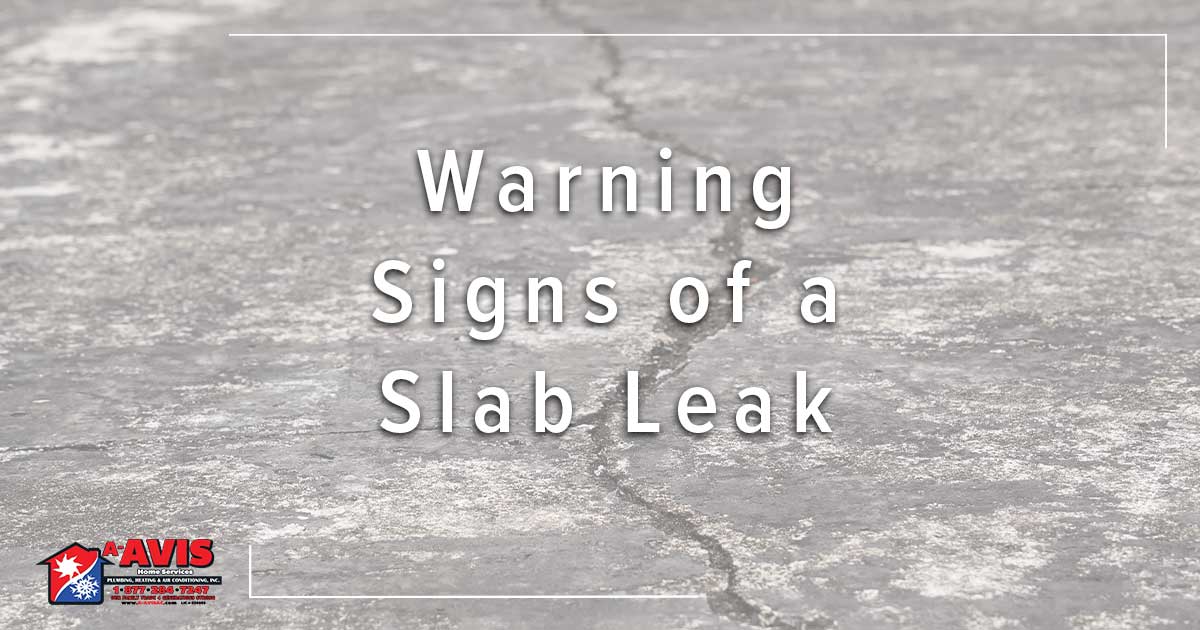If you’ve never heard the term slab leak, buckle up, it’s about to get rough. These leaks are one of the most challenging plumbing issues a homeowner can face. However, this plumbing problem only affects homes build on concrete slabs. For those not in the know, we’re explaining everything, including the warning signs of a slab leak.
What is a Slab Leak?
Slab leaks are something that only happens when your home is built on a concrete slab. They happen when a there is a leak in the water line that runs under your home’s concrete foundation.
When left untreated, slab leaks can do major damage to the foundation of your home. Eventually, the foundation can crack and move, causing your floors and walls to crack. In extreme causes, slab leaks have cause entire parts of a home to collapse.
How Common is it to Have a Slab Leak?

Unfortuantely, California homeowners need to be on the lookout for slab leaks. Earthquakes can easily break pipes and concrete, both of which lead to leaks.
Older and historic homes also need to be on the look out for these types of leaks. With enough time and use, the commonly used copper pipes can corrode, which will lead to a number of plumbing issues. Slab leaks being one of them.
Five Warning Signs of a Slab Leak
Here are some of the tell tale signs you’re dealing with a slab leak.
Your Floor feels Warm
When the hot water line bursts, many homeowners can feel it through their floor. When the hot water is running, many homeowners can feel warm spots on the floor.
It’s easier to feel warm water spots on floors with carpet or thin linoleum. Tile and hardwood floors make it harder to feel these spots.
No matter what material your floors are, warm spots are something that should be investigated as soon as possible by a professional.
Water Bills are Shooting Up

When there’s a slab leak water is running 24/7. This will make a noticeable difference in your water bill.
One of the best ways to monitor your plumbing system in general is to keep an eye on your water bills. A sudden increase can indicate a number of plumbing issues.
In addition to slab leaks, a high water bill could indicate:
- Leaks throughout your plumbing system
- A fixture in your home (i.e. the toilet) is leaking
- There’s a faucet that won’t stop dripping
- There’s a leak in your sprinkler system
Water Pressure is Lower than Normal

When you have an active leak in your plumbing system, it takes away precious water from your other fixtures. Meaning your shower, faucets, and other plumbing fixtures are not getting the same amount of water they normally do.
This all leads to a lackluster shower or dish cleaning session. When you notice your water pressure has dropped for seemingly no reason, it could be a good indicator you’re dealing with a slab leak.
Carpet or Flooring is Damp

When slab leaks aren’t caught early enough, there’s a very high possibility they can damage your carpet or flooring.
Since these pipes are buried in concrete, there aren’t a lot of places for the water to go. With enough time, the water can collect all the way up and into your home.
Random Puddles in or Outside of the Home

Just like we mentioned above, when a leak is left long enough, the water needs somewhere to go. This can mean finding puddles inside or outside your home.
If you notice water pooling around your foundation on a warm day, this is a very obvious sign it’s time to call a plumber as soon as possible. Slab leaks can also force water to puddle in places like, under your cabinets or around your washing machine.
Slab leaks are something that should absolutely be left to professionals. Call your local plumber immediately if you suspect there is a leak in your concrete foundation.


